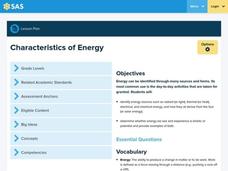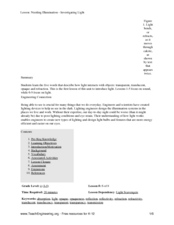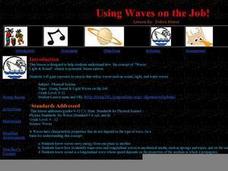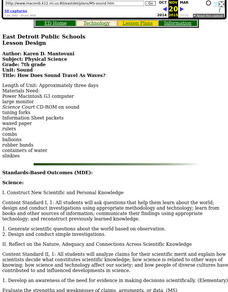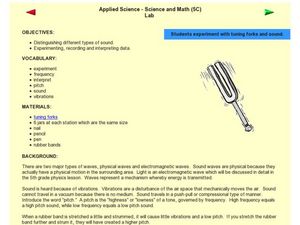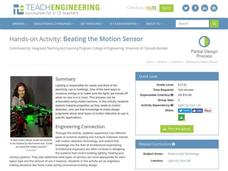Curated OER
Characteristics of Energy
Fourth graders view a video and create a KWL to identify energy sources. In this energy sources lesson, 4th graders explore the meaning of energy, kinetic energy, potential energy, thermal energy, radiant energy, and electrical energy....
Curated OER
Strange Sounds
Students investigate sound as a form of energy. In this energy, forces, and sound lesson plan, students explore how different sounds may be made as they make a variety of materials vibrate. Students observe the effects of vibrations and...
Curated OER
The Space Cadet's Laboratory: Using Electromagnetic Energy to Study Astronomy
Students build their own spectrophotometer to study light. In this physics lesson, students explain the dual nature of light. They calculate the angle of incidence and refraction using Snell's law equation.
Curated OER
Wavelengths of Light
Explore physical science by participating in a visual spectrum experiments. Budding scientists identify the colors in the color spectrum and view the colors in class by utilizing cellophane, flash lights, and other arts and crafts...
Curated OER
Investigating Light
Students study concepts associated with light. In this light lesson, students observe an demonstration by the teacher. They examine reflection and refraction of light and name things that reflect light and those that refract it. They...
Curated OER
Using Waves on the Job!
A colorful and comprehensive PowerPoint highlights this lesson on waves. Junior geophysicists pretend that they are hired to analyze seismic waves. A worksheet is provided to go along with an online article about how compact discs work...
Curated OER
Lights, Sounds, Fabrics and Designs: Careers in the World of Design
Young scholars investigate the broad range of jobs that can be found in the world of design. Students explore sound design, language architecture, etc. Young scholars design a resource book and post it on a website for others to share.
Curated OER
Color
An interesting set of details about the light spectrum, these slides explain how objects reflect and absorb light to affect how they appear to the human eye. The differences in mixing lights or pigments is explained and some everyday...
Texas State Energy Conservation Office
Investigation: Waves and Whistles
Wave goodbye to the same old demonstrations for alternative energy sources, and wave hello to this one investigating ocean waves! Using a water bottle to create an oscillating water column, learners see and possibly hear how the...
Curated OER
What’s That, I Can’t Hear You?
Young scholars investigate forms of energy as well as light and sound. In this science lesson, students participate in hands-on activities that require them to evaluate how sound affects astronauts in flight. A video of this lesson being...
IOP Institute of Physics
Physics in Concert
What do physicists and musicians have in common? A lot more than you might think. After first viewing a slide show presentation and completing a series of skills practice worksheets on the physics of light, sound, and electricity, young...
Curated OER
Waves: Sound and Light
A few definitions related to waves open this slide show. Note that the information only covers light waves even though the title mentions sound. Correct the title before using this resource. Another mention is a set of photos of a class...
Curated OER
Light, Sound and Energy
The students will be given opportunities to work independently and in teacher-directed situations to study and discover the many facets of light and sound, and the uses of energy in our environment. The grade 4 students will learn the...
Curated OER
How Does Sound Travel As Waves?
Seventh graders participate in a number of activities designed to increase their understanding of how sound is generated and how it travels.
Curated OER
Energy Forms
Students explore energy by participating in a science lab in class. In this energy form lesson, students define the different types of energy such as light, mechanical and sound while examining energy measuring tools in class. Students...
Curated OER
Kinetic and Potential Energy
In this kinetic and potential energy worksheet, students read for information and evaluate comprehension. In this multiple choice and fill in the blanks worksheet, students answer fifteen questions.
Curated OER
Sound Observations
Learners explore sound waves by conducting an experiment in class. In this sound frequency lesson, students utilize a tuning fork in class and identify which objects in class create different sound pitches on the fork. Learners conduct...
Curated OER
Heat and Light Come From Various Sources
First graders study heat and light and how they come from various sources. They list sources of heat and light and identify the different energy sources as heat, light, or both heat and light.
Curated OER
Physical Science: Solar Energy
Pupils review and discuss how Solar energy and electricity produce light and heat. They create a photo/picture journal and include pictures taken during solar energy activities to a PowerPoint slide presentation.
Curated OER
Vibrating Objects Produce Sound
Students use many different materials and resources in order to study and identify sounds that are loud or soft, high or low, pleasant or unpleasant.
Curated OER
Sound
Students complete a unit to learn about sound; students include multiplication and division problems along with rate problems. In this sound lesson, students complete 7 separate lessons with multiple activities to learn about sound.
Curated OER
Forms of Energy
Students, working in expert groups, study a form of energy. They plan a slide show presentation using pictures, clip art, and student taken digital pictures that show the energy type they have become experts in. They use a planning sheet...
K12 Reader
Waves & Currents
Challenge your young readers with a passage about physical science. After reading about sound waves and electric currents, kids answer five reading comprehension questions about what they have read.
Teach Engineering
Beating the Motion Sensor
I bet I can cross the room without having the lights come on. Class members set up an experiment in which they try to determine what materials will mask motion detected by a sensor. Groups predict how materials will interact with light,...


